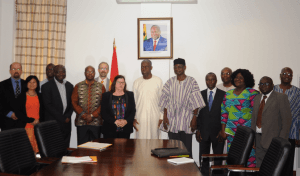Ghana to benefit from malnutrition reduction programme

The International Potato Centre has announced a programme to reduce malnutrition among pregnant women and children in 500,000 households in Ghana by 2023.
The programme is part of an international effort to also reduce malnutrition in pregnant women and children in 15,000,000 households in Africa as a whole.
Mrs Barbara Wells, Director General of the International Potato Centre, said this when she led a six-member delegation to pay a courtesy call on Vice President Kwesi Amissah-Arthur at his office at the Flagstaff House.
The delegation, which is made up of mainly research scientists, is collaborating with the Council for Scientific and Industrial Research (CSIR) and would be in the country for one week.
The International Potato Centre is a research organisation with its headquarters in Lima, Peru, that seeks to reduce poverty and achieve food security on a sustained basis in developing countries through scientific research and related activities on potato, sweet potato and other root and tuber crops.
Besides, the International Potato Centre is one of the 15 specialised research centres of the Consultative Group on International Agricultural Research (CGIAR), an international consortium of agricultural research organisations, having joined in 1972.
According Mrs Wells even though the organisation had been in Ghana since 1990 it ,however, wanted to increase its presence in the country.
She said both sweet potato and ordinary potato had a lot of medicinal properties for reducing malnutrition in pregnant women and children.
She said the International Potato Centre wanted to invest more in scientific research and use those research findings to support agriculture production in the country.
Mrs Wells also stated that sweet potato was a unique crop in terms of nutrition and had the potential to prevent blindness and reduction in stunted growth.
She called for collaboration between the research institutions and the farmers to enhance the breeding of varieties and use the outcome in production.
Vice President Kwesi Amissah-Arthur expressed concern about the numerous researches that had been carried by research institutions which were still on the shelves without being commercialised.
He called for the co-operation between the research institutions and the farmers to ensure that whatever research was carried out was made available to the appropriate organisations to use.
He again called on the research institutions to collaborate with the private sector in commercialising since research findings had to provide the scientific answers as well as demonstrate that findings were viable.
Source: GNA
